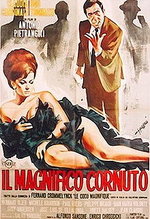bernardina
Moderator
Η ερώτηση του αγαπητού Μιχάλη έγινε αφορμή να αναρωτηθώ, πέρα από το πώς θα μεταφράζαμε στα αγγλικά τον ιδιωματισμό "του κερατά" που δεν έχει καμία άμεση σχέση με τον κερατά και το κέρατο, και από πού προήλθε η λέξη κερατάς. Μια πρώτη έρευνα στο διαδίκτυο είναι αλήθεια πως δεν με φώτισε ιδιαίτερα, με εξαίρεση αυτό το Υπογλώσσιο που έχει κάμποσα ενδιαφέροντα πράγματα.
Αντιγράφω (κρατώντας και τον αστερίσκο του ) :
) :
Εκδοχή 1
Κατά το «Μέγα Ετυμολογικόν Η-Ν» (Αρχική σύνταξη 10-11 αιώνας μ.Χ., 1η Έντυπη έκδοση 1499 – Μάρκος Μουσούρος) – Κάκτος 641 σ. 228 (βλ. Αποσπασμα):
κέρας είναι η τρίχα επειδή φυτρώνει στο κεφάλι όπως και τα κέρατα. Μια σημασία «η διαρκώς κειρωμένη» = αυτή που συνέχεια κουρεύεται ίσως να συσχετίζεται με την διαρκώς διαπομπευόμενη: την μοιχαλίδα.
Εκδοχή 2
Το κράνος των αρχαίων πολεμιστών έφερε κέρατα. Όταν ο πολεμιστής φόραγε τα κέρατα, πήγαινε δηλαδή στον πόλεμο, η σύζυγος εμοιχευετο με κάποιον ή κάποιους απόλεμους.
Εκδοχή 3
O Μιχαήλ Ψελλός (11ος μ.Χ. αιώνας) στο σύγγραμμά του «Πόθεν το του κερατά όνομα» (περί ονόματος του κερατά) αναφέρει ότι το «κερατάς» προέρχεται:
Από τα κερασφόρα ζώα βόδια κλπ που δεν έχουν μόνιμη ερωτική σύντροφο[*] και είναι νωθρά και βλακώδη.
Όλα τα κερασφόρα ζώα είναι κουτά. Το ελάφι, το σαλιγκάρι και το βουβάλι θεωρούνται τα πιο ηλίθια ζώα.
Έτσι και ο ηλίθιος άντρας που δεν παίρνει είδηση ότι η γυναίκα του δεν κλείνει πόδι όλη νύχτα, θα έπρεπε να είναι , κατά Ψελλόν, «ζώον κερασοφόρον»!
Στα Αγγλικά ο κερατάς λέγεται cuckold από τη λέξη cuckoo = κούκος, επειδή η κυρία κούκου, η κούκαινα δηλαδή πάει και γεννάει τα αυγά της σε φωλιές άλλων πουλιών για να γλυτώσει την ανατροφή τους. Με τούτο τον τρόπο σατιρίζονται όσοι μεγαλώνουν παιδί άλλου χωρίς να το γνωρίζουν!
Εκδοχή 4
Από το κεραξ, κέρας που στον Ησύχιο (ε-κ) 9052,σ. 466 (468) σημαίνει τρίχα, τόξο και αιδοίο.
Και επειδή παρακάτω αναφέρει
Η των κεράτων χρήσις είναι υπό της συζύγου χρήσις του αιδοίου απόντος του συζύγου.
[*] Τωρα το να μην έχεις μόνιμη ερωτική συντροφο είναι δείγμα βλακείας; Το συζητώ με όποια ενδιαφέρεται.
Επίσης αλλού βλέπω να υποστηρίζεται ότι τα κέρατα ως σημάδι μοιχείας περιορίζονται στον Νότο:
Αρχικά, καλό είναι να ξεκαθαρίσουμε πως η λέξη κερατάς δεν χρησιμοποιείται σε όλο τον κόσμο(παγκοσμίως) για να περιγράψει το άτομο στο οποίο, η γυναίκα του δεν είναι πιστή. Μόνο η Ελλάδα, η Ιταλία, η Ισπανία και η Πορτογαλία χρησιμοποιούν τη συγκεκριμένη λέξη. Για την ακρίβεια, η Ισπανία, η Πορτογαλία και η Ιταλία, όταν θέλουν να μιλήσουν για έναν απατημένο σύζυγο, τον αποκαλούν με την λέξη cabron (τράγος).
Ο τράγος λοιπόν, ανέχεται τη σεξουαλική πρόσβαση άλλων θηλυκών στο ταίρι του! Σε αντίθεση με τον κριό, ο οποίος δεν ανέχεται τον ανταγωνισμό και διακρίνεται για τον δυναμισμό και την βιαιότητα του, ο τράγος πάντα εμφανίζεται σαν ο πιο αδύναμος και ταπεινωμένος!
Ομολογώ ότι ο κούκος των Άγγλων μού φαίνεται πολύ πιο διαφανής από τα κερασφόρα των Νοτίων.
Και, τελικά, αντί να πάρω απάντηση μπερδεύτηκα περισσότερο. Κι ακόμα δεν κατάλαβα πώς από τα κέρατα του κερατωμένου περάσαμε στην επιτακτικότητα και το αυτονόητο του κερατά. Το κέρατό μου μέσα!:devil:
ΥΓ. Για τη γνωστή διαμάχη αν κερατάςείναι γίνεται μόνο ο άντρας ή κερατούται (σικ!) και η γυναίκα προτιμώ να μην τοποθετηθώ. Για την ώρα.

Αντιγράφω (κρατώντας και τον αστερίσκο του
Εκδοχή 1
Κατά το «Μέγα Ετυμολογικόν Η-Ν» (Αρχική σύνταξη 10-11 αιώνας μ.Χ., 1η Έντυπη έκδοση 1499 – Μάρκος Μουσούρος) – Κάκτος 641 σ. 228 (βλ. Αποσπασμα):
κέρας είναι η τρίχα επειδή φυτρώνει στο κεφάλι όπως και τα κέρατα. Μια σημασία «η διαρκώς κειρωμένη» = αυτή που συνέχεια κουρεύεται ίσως να συσχετίζεται με την διαρκώς διαπομπευόμενη: την μοιχαλίδα.
Εκδοχή 2
Το κράνος των αρχαίων πολεμιστών έφερε κέρατα. Όταν ο πολεμιστής φόραγε τα κέρατα, πήγαινε δηλαδή στον πόλεμο, η σύζυγος εμοιχευετο με κάποιον ή κάποιους απόλεμους.
Εκδοχή 3
O Μιχαήλ Ψελλός (11ος μ.Χ. αιώνας) στο σύγγραμμά του «Πόθεν το του κερατά όνομα» (περί ονόματος του κερατά) αναφέρει ότι το «κερατάς» προέρχεται:
Από τα κερασφόρα ζώα βόδια κλπ που δεν έχουν μόνιμη ερωτική σύντροφο[*] και είναι νωθρά και βλακώδη.
Όλα τα κερασφόρα ζώα είναι κουτά. Το ελάφι, το σαλιγκάρι και το βουβάλι θεωρούνται τα πιο ηλίθια ζώα.
Έτσι και ο ηλίθιος άντρας που δεν παίρνει είδηση ότι η γυναίκα του δεν κλείνει πόδι όλη νύχτα, θα έπρεπε να είναι , κατά Ψελλόν, «ζώον κερασοφόρον»!
Στα Αγγλικά ο κερατάς λέγεται cuckold από τη λέξη cuckoo = κούκος, επειδή η κυρία κούκου, η κούκαινα δηλαδή πάει και γεννάει τα αυγά της σε φωλιές άλλων πουλιών για να γλυτώσει την ανατροφή τους. Με τούτο τον τρόπο σατιρίζονται όσοι μεγαλώνουν παιδί άλλου χωρίς να το γνωρίζουν!
Εκδοχή 4
Από το κεραξ, κέρας που στον Ησύχιο (ε-κ) 9052,σ. 466 (468) σημαίνει τρίχα, τόξο και αιδοίο.
Και επειδή παρακάτω αναφέρει
Η των κεράτων χρήσις είναι υπό της συζύγου χρήσις του αιδοίου απόντος του συζύγου.
[*] Τωρα το να μην έχεις μόνιμη ερωτική συντροφο είναι δείγμα βλακείας; Το συζητώ με όποια ενδιαφέρεται.
Επίσης αλλού βλέπω να υποστηρίζεται ότι τα κέρατα ως σημάδι μοιχείας περιορίζονται στον Νότο:
Αρχικά, καλό είναι να ξεκαθαρίσουμε πως η λέξη κερατάς δεν χρησιμοποιείται σε όλο τον κόσμο(παγκοσμίως) για να περιγράψει το άτομο στο οποίο, η γυναίκα του δεν είναι πιστή. Μόνο η Ελλάδα, η Ιταλία, η Ισπανία και η Πορτογαλία χρησιμοποιούν τη συγκεκριμένη λέξη. Για την ακρίβεια, η Ισπανία, η Πορτογαλία και η Ιταλία, όταν θέλουν να μιλήσουν για έναν απατημένο σύζυγο, τον αποκαλούν με την λέξη cabron (τράγος).
Ο τράγος λοιπόν, ανέχεται τη σεξουαλική πρόσβαση άλλων θηλυκών στο ταίρι του! Σε αντίθεση με τον κριό, ο οποίος δεν ανέχεται τον ανταγωνισμό και διακρίνεται για τον δυναμισμό και την βιαιότητα του, ο τράγος πάντα εμφανίζεται σαν ο πιο αδύναμος και ταπεινωμένος!
Ομολογώ ότι ο κούκος των Άγγλων μού φαίνεται πολύ πιο διαφανής από τα κερασφόρα των Νοτίων.
Και, τελικά, αντί να πάρω απάντηση μπερδεύτηκα περισσότερο. Κι ακόμα δεν κατάλαβα πώς από τα κέρατα του κερατωμένου περάσαμε στην επιτακτικότητα και το αυτονόητο του κερατά. Το κέρατό μου μέσα!:devil:
ΥΓ. Για τη γνωστή διαμάχη αν κερατάς


